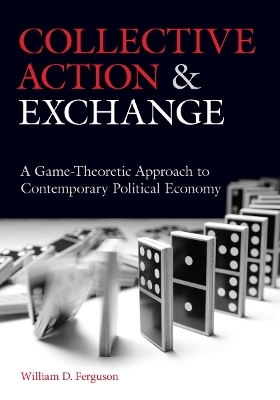
Collective Action and Exchange
A Game-Theoretic Approach to Contemporary Political Economy
Seiten
2013
Stanford University Press (Verlag)
978-0-8047-7003-3 (ISBN)
Stanford University Press (Verlag)
978-0-8047-7003-3 (ISBN)
In Collective Action and Exchange: A Game-Theoretic Approach to Contemporary Political Economy , author William D. Ferguson unifies a broad range of new developments in economic theory and closely related areas of study to present a comprehensive political economy text, aimed at advanced undergraduates in economics and graduate students in the social sciences.
In Collective Action and Exchange: A Game-Theoretic Approach to Contemporary Political Economy, William D. Ferguson presents a comprehensive political economy text aimed at advanced undergraduates in economics and graduate students in the social sciences. The text utilizes collective action as a unifying concept, arguing that collective-action problems lie at the foundation of market success, market failure, economic development, and the motivations for policy.
Ferguson draws on information economics, social preference theory, cognition theory, institutional economics, as well as political and policy theory to develop this approach. The text uses classical, evolutionary, and epistemic game theory, along with basic social network analysis, as modeling frameworks. These models effectively bind the ideas presented, generating a coherent theoretic approach to political economy that stresses sometimes overlooked implications.
In Collective Action and Exchange: A Game-Theoretic Approach to Contemporary Political Economy, William D. Ferguson presents a comprehensive political economy text aimed at advanced undergraduates in economics and graduate students in the social sciences. The text utilizes collective action as a unifying concept, arguing that collective-action problems lie at the foundation of market success, market failure, economic development, and the motivations for policy.
Ferguson draws on information economics, social preference theory, cognition theory, institutional economics, as well as political and policy theory to develop this approach. The text uses classical, evolutionary, and epistemic game theory, along with basic social network analysis, as modeling frameworks. These models effectively bind the ideas presented, generating a coherent theoretic approach to political economy that stresses sometimes overlooked implications.
William D. Ferguson is the Gertrude B. Austin Professor of Economics at Grinnell College, where he teaches courses on labor economics, policy analysis, applied game theory, and political economy.
| Erscheint lt. Verlag | 24.7.2013 |
|---|---|
| Zusatzinfo | 8 tables, 68 figures |
| Verlagsort | Palo Alto |
| Sprache | englisch |
| Maße | 178 x 254 mm |
| Gewicht | 953 g |
| Themenwelt | Wirtschaft ► Allgemeines / Lexika |
| Wirtschaft ► Volkswirtschaftslehre ► Mikroökonomie | |
| Wirtschaft ► Volkswirtschaftslehre ► Wirtschaftspolitik | |
| ISBN-10 | 0-8047-7003-4 / 0804770034 |
| ISBN-13 | 978-0-8047-7003-3 / 9780804770033 |
| Zustand | Neuware |
| Haben Sie eine Frage zum Produkt? |
Mehr entdecken
aus dem Bereich
aus dem Bereich
Wirtschaftszusammenhänge verstehen und mitreden können
Buch | Softcover (2023)
Wiley-VCH (Verlag)
CHF 27,95
die psychologischen Determinanten menschlicher Entscheidungen
Buch | Softcover (2024)
Kohlhammer (Verlag)
CHF 54,60


